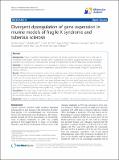| dc.contributor.author | Kong, Sek | |
| dc.contributor.author | Sahin, Mustafa | |
| dc.contributor.author | Krueger, Dilja | |
| dc.contributor.author | Collins, Christin D. | |
| dc.contributor.author | Wertz, Mary H. | |
| dc.contributor.author | Campbell, Malcolm G. | |
| dc.contributor.author | Leech, Jarrett D. | |
| dc.contributor.author | Bear, Mark | |
| dc.contributor.author | Kunkel, Louis M. | |
| dc.contributor.author | Kohane, Isaac S. | |
| dc.date.accessioned | 2016-04-29T14:33:48Z | |
| dc.date.available | 2016-04-29T14:33:48Z | |
| dc.date.issued | 2014-02 | |
| dc.date.submitted | 2013-06 | |
| dc.identifier.issn | 2040-2392 | |
| dc.identifier.uri | http://hdl.handle.net/1721.1/102332 | |
| dc.description.abstract | Background
Fragile X syndrome and tuberous sclerosis are genetic syndromes that both have a high rate of comorbidity with autism spectrum disorder (ASD). Several lines of evidence suggest that these two monogenic disorders may converge at a molecular level through the dysfunction of activity-dependent synaptic plasticity.
Methods
To explore the characteristics of transcriptomic changes in these monogenic disorders, we profiled genome-wide gene expression levels in cerebellum and blood from murine models of fragile X syndrome and tuberous sclerosis.
Results
Differentially expressed genes and enriched pathways were distinct for the two murine models examined, with the exception of immune response-related pathways. In the cerebellum of the Fmr1 knockout (Fmr1- KO) model, the neuroactive ligand receptor interaction pathway and gene sets associated with synaptic plasticity such as long-term potentiation, gap junction, and axon guidance were the most significantly perturbed pathways. The phosphatidylinositol signaling pathway was significantly dysregulated in both cerebellum and blood of Fmr1-KO mice. In Tsc2 heterozygous (+/−) mice, immune system-related pathways, genes encoding ribosomal proteins, and glycolipid metabolism pathways were significantly changed in both tissues.
Conclusions
Our data suggest that distinct molecular pathways may be involved in ASD with known but different genetic causes and that blood gene expression profiles of Fmr1- KO and Tsc2+/− mice mirror some, but not all, of the perturbed molecular pathways in the brain. | en_US |
| dc.language.iso | en_US | |
| dc.publisher | Biomed Central Ltd. | en_US |
| dc.relation.isversionof | http://dx.doi.org/10.1186/2040-2392-5-16 | en_US |
| dc.rights | Creative Commons Attribution | en_US |
| dc.rights.uri | http://creativecommons.org/licenses/by/2.0/ | en_US |
| dc.source | BMC | en_US |
| dc.title | Divergent dysregulation of gene expression in murine models of fragile X syndrome and tuberous sclerosis | en_US |
| dc.type | Article | en_US |
| dc.identifier.citation | Kong, Sek, Mustafa Sahin, Christin D Collins, Mary H Wertz, Malcolm G Campbell, Jarrett D Leech, Dilja Krueger, Mark F Bear, Louis M Kunkel, and Isaac S Kohane. “Divergent Dysregulation of Gene Expression in Murine Models of Fragile X Syndrome and Tuberous Sclerosis.” Mol Autism 5, no. 1 (2014): 16. | en_US |
| dc.contributor.department | Massachusetts Institute of Technology. Department of Brain and Cognitive Sciences | en_US |
| dc.contributor.department | Picower Institute for Learning and Memory | en_US |
| dc.contributor.mitauthor | Krueger, Dilja | en_US |
| dc.contributor.mitauthor | Bear, Mark | en_US |
| dc.relation.journal | Molecular Autism | en_US |
| dc.eprint.version | Final published version | en_US |
| dc.type.uri | http://purl.org/eprint/type/JournalArticle | en_US |
| eprint.status | http://purl.org/eprint/status/PeerReviewed | en_US |
| dspace.orderedauthors | Kong, Sek; Sahin, Mustafa; Collins, Christin D; Wertz, Mary H; Campbell, Malcolm G; Leech, Jarrett D; Krueger, Dilja; Bear, Mark F; Kunkel, Louis M; Kohane, Isaac S | en_US |
| mit.license | PUBLISHER_CC | en_US |
